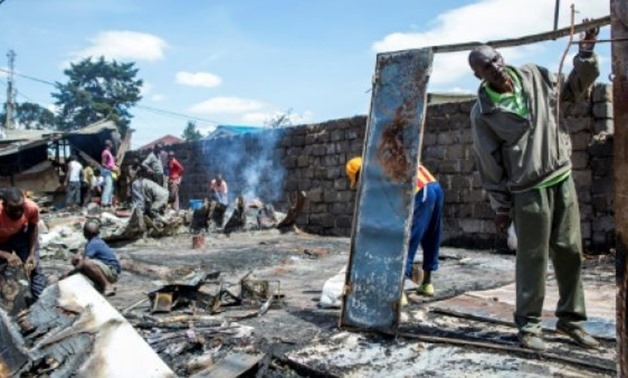
Residents of Nairobi's Kibera slum clean up a shop that was burned down during clashes after President Uhuru Kenyatta was declared the winner of last week's protest-hit election - AFP / by Hazel WARD
NAIROBI - 31 Oct 2017: Kenya was once again left waiting Tuesday, as embattled opposition leader Raila Odinga prepared to lay out his strategy following a boycott of last week's protest-hit elections that handed President Uhuru Kenyatta a landslide win.
Thursday's contest saw Kenyatta winning with 98 percent of the votes cast.
He hailed the result as vindication of his triumph in an initial August poll which was later overturned by the country's Supreme Court.
But it proved to be a bittersweet victory.
Turnout was just 38.8 percent, marring the credibility of a vote that has deeply polarised the East African nation, sparking months of bitter infighting, legal wrangling and violent protest.
"This was nothing more than a revalidation of (the voters') general will," said Kenyatta, while admitting the result was likely to face further legal challenges.
The vote was the chaotic climax of two months of political drama and acrimony after the Supreme Court overturned Kenyatta's victory in August 8 polls over widespread irregularities and mismanagement by the IEBC.
Kenya's Daily Nation newspaper said the Kenyatta and his Jubilee party must prioritise national reconciliation through dialogue with Odinga to find "an inclusive system that reflects the face of the nation".
"More crucially, the country must avoid violence. (Odinga's) National Super Alliance, which has been rooting for civil disobedience, must rethink its strategy. It is not tenable to continue with street protests at a time the nation is bleeding and hurting," it said.
Thursday's vote was fraught with problems, with violent demonstrations preventing polling in four western counties where Odinga supporters had widely observed a boycott, prompting two days of running battles with security forces that left nine dead.
So far, Odinga has remained silent but vowed to address his followers on Tuesday.
Fears are high that further protests would break out in opposition strongholds in the west where voting was violently blocked, or in flashpoint Nairobi slums.
"People are not happy, how can they declare the results when four counties have not voted? This is illegal," said a man watching as several hundred people chanting anti-Kenyatta slogans in the western city of Kisumu, after results were announced.
"Let's wait to hear what Raila will say, he will give the way forward."
- A new strategy? -
With all eyes on Odinga and his supporters, in what to many felt like a repeat of the post-vote scenario back in August, observers and commentators were quick to call for calm and dialogue.
If anyone had a problem with election result, "please let's go back to the courts and raise whatever concerns," said former South African president Thabo Mbeki who headed the African Union (AU) Election Observer Mission in Kenya.
Despite his successful bid to overturn the results of the August election, Odinga withdrew from the re-run some two weeks beforehand, citing concerns the new vote would be neither free nor fair.
He has since pledged to transform his National Super Alliance (NASA) coalition into "a resistance movement" that will spearhead a campaign of "civil disobedience", and will likely launch further legal challenges to the validity of Thursday's election.
Kenyan commentator Macharia Gaitho said the conclusion of the elections, however flawed had "shifted the playing field to Jubilee's advantage".
"The NASA game plan is yet to be fully revealed, but one can expect that to remain relevant, the opposition must move fast to demonstrate that it cannot be business as usual," he said.
"We saw from Mr Kenyatta?s acceptance speech Monday that he is not ready for dialogue. The reality is that failure to act now will be a deliberate refusal to address the festering sores that muddy our politics. Those sores will be the trigger for continuing violence, instability and national decline."
Aside from some scuffles on Monday after the announcement, things have been largely calm over the weekend, although security was further stepped up across the country on Tuesday as more than a million pupils aged between 13 and 15 began sitting their Kenya Certificate of Primary Education (KCPE) exams.
The political crisis is the worst to hit the country since a 2007 vote sparked months of politically-driven ethnic violence that left 1,100 people dead.


Comments
Leave a Comment